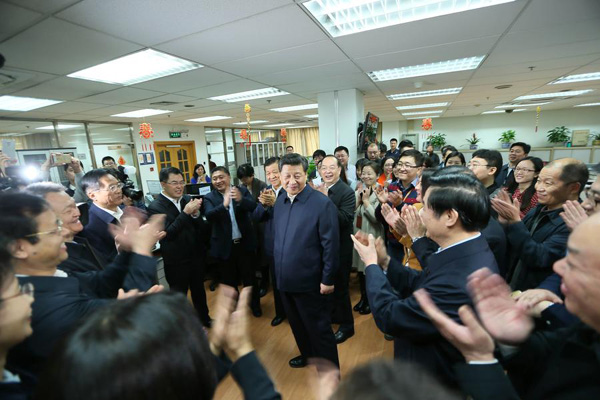Journalists can help improve China's image
Updated: 2016-03-07 08:05
By TOM PLATE(China Daily)
|
||||||||
 |
|
President Xi Jinping meets with the editors and other staff in the newsroom at the headquarters of People's Daily newspaper. [Photo/Xinhua] |
I have been traveling to Asia and writing about it in various newspapers and journals for two decades, and I have visited China many times to know it closely. My observation about China is substantially different from most of the written accounts I read or video-view back home in the United States through the media.
China can, should and must do a much better job of explaining itself and its views to the world. For China, "a great culture with inexhaustible wisdom", global public opinion does matter. China's prosperity, not to mention peace, depends on true mutual understanding and warranted global respect. A wider, clearer message to the world has to come from its heart and brain.
For that, China has to immediately start a determined step-by-step amplification program. It has to let a hundred programs bloom. Take for example TV shows in the US that focus on politics. Issues such as the South China Sea sometimes get their attention. Some American journalists are guests on such shows, discussing China and its intentions. Why not invite China's best and most articulate journalists to participate in shows that reach an elite audience? Perhaps China could send its more articulate (and witty) diplomats to such shows?
China also needs to offer better visuals. Until 2008, they were dreadful. Then came the Beijing 2008 Olympic Games and the Bird's Nest (or National Stadium), and the West was wowed. But in the absence of more visuals that showcase modern China, the Western media will default to the same dreary Cold-War images of the old China.
"We are living in a time when misunderstandings about China show no sign of abating," said Sameh El-Shahat, president of China-i, a Beijing brand strategist. "China is the subject of too much negativity." I also concur with Zhang Jinsheng, deputy head of Jinan University's journalism and communications school, who has proposed that Chinese news outlets use their international influence to amplify the country's voice on important issues.
- Global health entering new era: WHO chief
- Brazil's planning minister steps aside after recordings revelation
- Vietnam, US adopt joint statement on advancing comprehensive partnership
- European border closures 'inhumane': UN refugee agency
- Japan's foreign minister calls A-bombings extremely regrettable
- Fukushima impact unprecedented for oceans: US expert

 Stars of Lijiang River: Elderly brothers with white beards
Stars of Lijiang River: Elderly brothers with white beards
 Wealthy Chinese children paying money to learn British manners
Wealthy Chinese children paying money to learn British manners
 Military-style wedding: Fighter jets, grooms in dashing uniforms
Military-style wedding: Fighter jets, grooms in dashing uniforms
 Striking photos around the world: May 16 - May 22
Striking photos around the world: May 16 - May 22
 Robots help elderly in nursing home in east China
Robots help elderly in nursing home in east China
 Hanging in the air: Chongqing holds rescue drill
Hanging in the air: Chongqing holds rescue drill
 2.1-ton tofu finishes in two hours in central China
2.1-ton tofu finishes in two hours in central China
 Six things you may not know about Grain Buds
Six things you may not know about Grain Buds
Most Viewed
Editor's Picks

|

|

|

|

|

|
Today's Top News
Liang avoids jail in shooting death
China's finance minister addresses ratings downgrade
Duke alumni visit Chinese Embassy
Marriott unlikely to top Anbang offer for Starwood: Observers
Chinese biopharma debuts on Nasdaq
What ends Jeb Bush's White House hopes
Investigation for Nicolas's campaign
Will US-ASEAN meeting be good for region?
US Weekly

|

|









